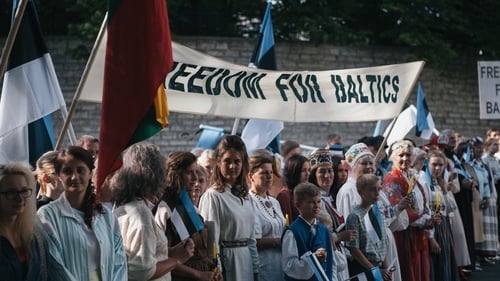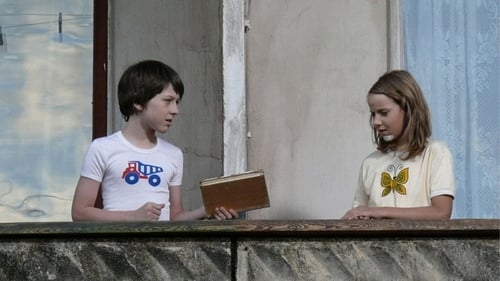Audrius Kemežys
出生 : 1973-01-01, Birštonas, Lithuania

Director of Photography
At the beginning of the 1960s, when the French pioneers of cinéma vérité set out to achieve a new realism, and when direct cinema in Québec began to vie for notice, the Baltics wit-nessed the birth of a generation of documentarists who favored a more romantic view of the world around them. This meditative documentary essay – from a Latvian writer and Lithuanian director whose composed touch has long dovetailed with the stylistically diverse works of the Baltic New Wave – pushes adroitly past the limits of the common his-toriographic investigation to create a portrait of less-clearly remembered filmmakers. The result is a consummate poetic treatment of the ontology of documentary creation. Also a cinematic poem about cinema poets.

Director of Photography
They're called water carriers, domestics, 'gregarios', 'Sancho Panzas' of professional cycling. Always at the back of the group, with no right for a personal victory. These wonderful losers are the true warriors of professional cycling.

Director of Photography
Seneca’s Day is set in the year 1989, the final period of the Soviet era in Lithuania. Eighteen-year old buddies establish the Seneca’s Fellowship with the motto “Live each day as if it was your last”. A love triangle breaks up the fellowship right at the time the nation experiences an exceptional sense of community via Baltic Chain.Twenty-five years later, the main character who at first glance appears to be accompanied by good luck, is disillusioned with himself. He has betrayed the ideals of his youth and become a cold observer of life.

Director of Photography
Lithuanian photographer, the legend of Soviet Sixties' generation Vitas Luckus tragically passed away in 1987. Yet the life and times of the talented rebel still impassion and lead us to a journey questioning why, at all times, we are wary of those who are really free.

Camera Operator
A cinematic journey into one of the greatest European noble families, the Radziwiłłs. Even the King would stand up when Radziwiłł the Black entered the room. Members of the Radziwiłł family weren’t afraid to defend the Reformers when the fires of the Inquisition burned across Europe. It was a Radziwiłł who went on one of the most challenging pilgrimages from Vilnius to Jerusalem and then published an account, becoming the pioneer of travel literature. A mix of documentary and fiction, past and present, and history and its re-enactment, brings to life the essence of a once-popular saying: “I don’t want to be a king. I want to be a Radziwiłł.”

Director of Photography
Ramin, an ex-wrestler who once won seven matches in 55 seconds, lives alone in the east Georgian town of Kvareli. Long time ago he fell in love with a girl whom he lost soon after he met her. Now, at 75, still unmarried but full of life, he travels to a remote Georgina village to seek her out. This film presents Ramir's journey through the Georgian landscape and through the memories of this man with a old aged body and an unbeatable heart.

Director of Photography
A subjective portrait of the famous Lithuanian filmmaker. The film combines interviews of Bartas, talking about his films, his creative intentions, reminiscing about the beginning of his career as a filmmaker, and Coudray’s personal opinion on the director.

Director of Photography
“Man-Horse” is a film about an old farmer, Jonas, and his horse. It is an intimate story about the existential relationship between human and animal; it is about solitude and the daily effort to survive. The film's director and Jonas Šalomskas are neighbours in the village of Užuguostis. They have known each other for two decades.

Director of Photography
Soviet eighties. A little town in the periphery. After his parents' divorce, 11-year-old Rolanas and his dad move in next door to same-aged Emilija. Friendship is born between the kids, however, shyness or fear of opening up makes them communicate through the wall, sitting in their own balconies, or through a socket connecting their flats. Emilija's parents also appear to be on the verge of divorce. The children discover common topics, activities. Unfortunately, a nearly tragic accident prevents Emilija to go to the balcony. This encourages both children to set out for a "real" date.

Director of Photography
During the Swedish-Lithuanian war 300 years ago, the bell of the Plateliai church was apparently dismantled and then left to sink at the centre of the eponymous lake. Stonys followed a scientific diving expedition organised for the purpose of finding the disappeared bell and thus confirming what seems like a popular legend. Like in Countdown, the filmmaker widens his consideration of collective memory and the bringing into crisis of belief.

Director of Photography
The astronaut Chris Kelvin receives a visit from a woman who is a double of his dead wife. This story, told in Stanislaw Lem’s eponymous novel, was once adapted into the film Solaris by the legendary Russian film director Andrei Tarkovsky. According to Deimantas Narkevičius, Tarkovsky was not as critical of the increasing impact of electronic media on relationships and on the complex nature of human memory as Lem, the original author of the story. In this video, the actor Donatas Banionis reappears in his role as Kelvin, forty years after Tarkovsky’s film was shot. Revisiting Solaris is based on the last chapter of Lem's book, which had been left out of Tarkovsky’s adaptation. In order to visualize the landscape of Solaris and expose complex specters of the past, Narkevičius combines the new footage and a series of photos from 1905 taken by the Lithuanian painter and composer Mykolojus Konstantinas Čiurlionis.

Director of Photography
Sorrow does not come merely from contemplating death, which forces us to look into Eternity, but also from life, which compels us to confront Time", wrote Russian philosopher Nikolai Berdyayev. Renowned Lithuanian documentarist Audrius Stonys took these words as a motto for his latest film, a meditative visual essay which portrays old people undertaking all kinds of activities, meditation and group laughter therapy. Without a single word of commentary, he creates from sophisticated, aesthetic images a compelling study of human corporeality which, in an ideal union with spiritual equilibrium, can sustain us with the pledge that old age doesn't have to be a painful wait for the last breath.

Director of Photography
Vulkanovka is a poor village in Crimean steppe, as local people say, forgotten by God and by people. Nonetheless that place came very much alive when famous Lithuanian film director Sharunas Bartas crew stayed here for almost two years filming Seven Invisible Men. Most of local people helped filmmakers a good deal. But the Grand Cinema left and probably won’t come back. So the life of Vulkanovka returned to its usual routine. But it’s not for everyone. Film director Giedre Beinoriute with her crew came to Vulkanovka nine months later. In her documentary people speak about their “cinematographic” experience with great enthusiasm. They tell about how it was and how it was different from their earlier understanding about filmmaking. Different moods and people’s openness in the film are interwoven into daily life of Vulkanovka with its rituals of caws’ feeding, shopping in the only shop “Produkty”, collecting metal and other.

Editor
"The film Energy in Lithuania is a documentary study of an industrial installation (an electric power plant), which includes conversations with people who have worked there. Although the power plant is functioning, it has now become like a museum of industrial thought. Still, the livelihood of thousands of people depend on it. It will not be easy to reform industrial society. The biggest challenge is to find a credible intellectual replacement for positivist industrial romanticism." - Deimantas Narkevičius

Cinematography
"The film Energy in Lithuania is a documentary study of an industrial installation (an electric power plant), which includes conversations with people who have worked there. Although the power plant is functioning, it has now become like a museum of industrial thought. Still, the livelihood of thousands of people depend on it. It will not be easy to reform industrial society. The biggest challenge is to find a credible intellectual replacement for positivist industrial romanticism." - Deimantas Narkevičius














